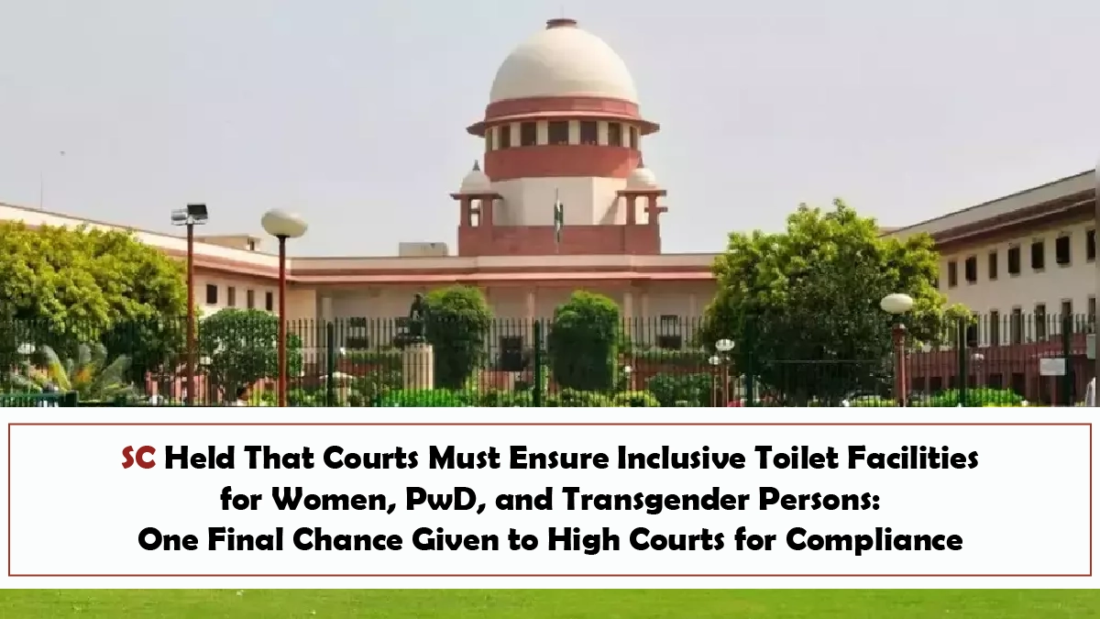Facts of the Case
The case arose from a writ petition highlighting the absence and inadequacy of basic toilet facilities in courts across India, particularly affecting women, persons with disabilities (PwD), and transgender persons. The Supreme Court, acknowledging the seriousness of the issue, delivered a landmark judgment on January 15, 2025, directing the High Courts and respective State Governments to ensure construction and maintenance of inclusive and accessible toilets in court complexes. The matter was listed again on July 16, 2025, to review compliance. The Court expressed deep concern over poor implementation, stating that many High Courts had failed to submit compliance reports. The Court issued a stern warning that failure to comply within eight weeks would compel the personal appearance of the Registrar Generals of the defaulting High Courts.
Contentions of the Petitioner
The petitioner, Rajeeb Kalita, contended that the non-availability and poor maintenance of toilets in court complexes, particularly for women, PwD, and transgender individuals, was a violation of dignity, accessibility, and right to equality guaranteed under Articles 14 and 21 of the Constitution. He argued that courts—temples of justice—should set a standard for public infrastructure, especially for judicial officers, lawyers, litigants, and staff who frequent these premises daily. The petitioner urged the Court to issue binding directions to ensure immediate construction of inclusive toilet infrastructure and formation of oversight mechanisms to monitor their implementation and upkeep.
Contentions of the Respondents
The respondents, which included various High Courts and State authorities, did not contest the need for toilet infrastructure, but they highlighted logistical and structural challenges in old heritage buildings, limited space, budgetary constraints, and ongoing construction or renovation efforts. Some High Courts submitted status reports affirming compliance or outlining steps being taken. These included the High Courts of Delhi, Kerala, Patna, Calcutta, Madhya Pradesh, Punjab & Haryana, Jammu & Kashmir and Ladakh, Allahabad, Telangana, Chhattisgarh, and Jharkhand. However, several others had yet to respond or act in accordance with the January 15 judgment.
Court’s Observations
The Supreme Court, in a detailed and progressive judgment authored by Justice R. Mahadevan and concurred by Justice J.B. Pardiwala, reiterated the urgent need for inclusive and hygienic toilet facilities in all court premises. The Court observed that:
“Access to clean, functional, and inclusive toilets is a fundamental dignity right, especially in a space like the judiciary, which symbolises the rule of law and fairness.”
The bench expressed disappointment that even women judicial officers lacked private washrooms in several courts and acknowledged the plight of litigants, especially vulnerable populations. It highlighted that the issue was not merely infrastructural but also reflective of systemic neglect. The Court noted that a proper sanitation framework was a constitutional obligation and directed High Courts to take a leadership role in ensuring dignity and inclusiveness in the administration of justice.
Court’s Order
In the final order dated July 16, 2025, the Supreme Court issued a stern directive giving a last opportunity to High Courts that had not yet submitted compliance affidavits. The Court stated that if the reports were not filed within eight weeks, the Registrar Generals of the defaulting High Courts would be summoned in person to explain the delay. The Court reaffirmed the directions passed on January 15, 2025, which included:
- Construction of separate, clearly identifiable, and accessible toilet facilities for males, females, PwDs, and transgender persons.
- Formation of a monitoring committee in each High Court chaired by a nominated Judge and comprising the Registrar General, Chief Secretary, PWD and Finance Secretaries, Bar Association representative, etc.
- Detailed tasks for the committee including surveys, planning, sanitation audits, construction, maintenance, use of alternate eco-friendly toilets, and child-friendly and mother-care amenities.
- Mandatory cleaning schedules, maintenance through professional agencies, redressal mechanisms, and appointment of nodal officers in each court complex.
- Periodic inspections and a grading system to incentivise court complexes for cleanliness and inclusivity.
- Allocation of separate and transparent funds by State Governments for implementation.
The judgment was directed to be circulated among all Chief Secretaries of States/UTs and Registrar Generals of High Courts. Justice Pardiwala orally cautioned that contempt proceedings could follow if non-compliance persisted.
Written by Adv. Deeksha Rai
 Cart is empty
Cart is empty 

